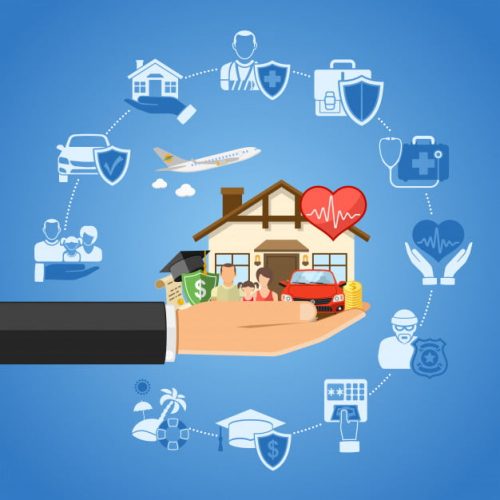Life Insurance Policy against COVID-19 Pandemic
Staying in lockdown for over months, we all are very clear about what COVID-19 actually is and its effects in every individual’s daily life and the whole world’s economy. This pandemic has currently turned the whole world upside-down. Every person in the world is worried and scared for life.
For us to overcome this pandemic, the government has played significant roles in suppressing the pandemic from spreading. The government has also provided different schemes and policies for insurance companies which secures the people financially if they are found infected.
What is COVID-19 and how to prevent yourself?

Coronavirus disease 2019 (COVID-19) is an infectious disease caused by severe acute respiratory syndrome coronavirus 2 (SARS-CoV-2). It was first identified in December 2019 in Wuhan, China, and has since spread globally, resulting in an ongoing pandemic. As of 2 June 2020, more than 6.3 million cases have been reported across 188 countries and territories, resulting in more than 376,000 deaths. More than 2.71 million people have recovered.
Common symptoms include fever, cough, fatigue, shortness of breath, and loss of smell and taste. While the majority of cases result in mild symptoms, some progress to acute respiratory distress syndrome (ARDS) likely precipitated by a cytokine storm, multi-organ failure, septic shock, and blood clots. The time from exposure to onset of symptoms is typically around five days but may range from two to fourteen days.
The virus is primarily spread between people during close contact, most often via small droplets produced by coughing, sneezing, and talking. The droplets usually fall to the ground or onto surfaces rather than travelling through air over long distances. Less commonly, people may become infected by touching a contaminated surface and then touching their face. It is most contagious during the first three days after the onset of symptoms, although spread is possible before symptoms appear, and from people who do not show symptoms. The standard method of diagnosis is by real-time reverse transcription polymerase chain reaction (rRT-PCR) from a nasopharyngeal swab. Chest CT imaging may also be helpful for diagnosis in individuals where there is a high suspicion of infection based on symptoms and risk factors; however, guidelines do not recommend using CT imaging for routine screening.


Recommended measures to prevent infection according to World Health Organization (WHO) include:
- Regularly and thoroughly clean your hands with an alcohol-based hand rub or wash them with soap and water.
- Maintain at least 1 meter (3 feet) distance between yourself and others.
- Avoid going to crowded places.
- Avoid touching eyes, nose and mouth because your hand touches many surfaces and can pick up viruses.
- Make sure you, and the people around you, follow good respiratory hygiene. This means covering your mouth and nose with your bent elbow or tissue when you cough or sneeze. Then dispose of the used tissue immediately and wash your hands.
- Stay home and self-isolate even with minor symptoms such as cough, headache, mild fever, until you recover. Have someone bring you supplies. If you need to leave your house, wear a mask to avoid infecting others.
- If you have a fever, cough and difficulty breathing, seek medical attention, but call by telephone in advance if possible and follow the directions of your local health authority.
- Keep up to date on the latest information from trusted sources, such as WHO or your local and national health authorities.
Insurance policy to combat against coronavirus
“It’s better to be safe than sorry”. Purchasing or insuring with an insurance policy is to play safe with your life than to play with risk by not purchasing it.
It may intrigue many people that the sound of death is really devastating. Losing someone you love is painful but losing them untimely is really painful. Time like this where we are in continuous battle with coronavirus pandemic losing a healthy member of the family can result in devastating situations for family members. The sad emotions that go through family members are separate and expenses that are to be borne are separate and to clarify, proper funerals don’t come cheap. But to have someone backing you and your family members financially, eases your heart a little. That’s where insurance comes to your aid. The government of Nepal has laid a new insurance scheme namely COVID-19 INSURANCE to provide that aid, which even helps people with low income.
Stating that insurance policy for fatal diseases would be as per the scheme, the government has directed its categorization into ‘A’ and ‘B’.
In category A
A person is charged Rs 1,000 as insurance fee to register for the scheme worth up to Rs 100,000 per person. In case, all members of a family register, Rs 600 is charged as insurance fee.
In category B
The government has introduced another insurance scheme worth Rs 50,000 per person. To register for the scheme, a person for an individual insurance plan is charged Rs 500 as insurance fee and all members of a family Rs 300 per person.
Life Insurance Policies Formed by Government of Nepal for COVID-19
The recently formed insurance policy name “CoronaVirus Insurance Policy” lies under the Life Insurance Policy which provides aids against the life threatening disease namely COVID-19. This Insurance policy provides the Corona patient with financial aids for medical expenses required for the patient to bear.
The insurance policy formed by Nepal government is:
http://nib.gov.np/wp-content/uploads/2020/05/Corona_Ins_Policy-Final-2077.01.30.pdf
